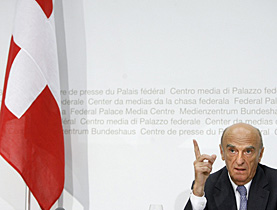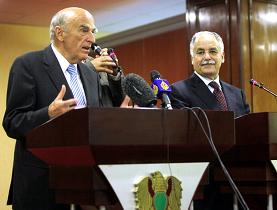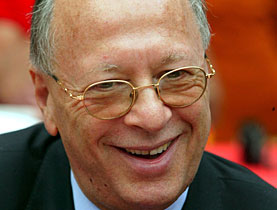Scots and Swiss deal with separate Libyan crises

While President Hans-Rudolf Merz's apology to Libya for the arrest of Hannibal Gaddafi continues to resonate, Scotland is dealing with a separate Libyan crisis.
Last Thursday – the day Merz announced he had ended a year-long feud with Tripoli by apologising for the arrest of the Libyan ruler’s son in Geneva last year – the Scottish government released a Libyan national, Abdelbaset al-Megrahi, from prison.
Megrahi, convicted of the 1988 Pan Am bombing over Lockerbie in Scotland, received a life sentence in 2001. Terminally ill, he was allowed home to die.
The Scottish decision has provoked strong criticism, in particular in the United States, where threats have been made of a tourism and economic boycott of the country.
Rob Corbidge, foreign editor with the Scottish daily The Scotsman, talks to swissinfo.ch about the parallels – and differences – between the two cases.
swissinfo.ch: What is the political mood like in Scotland following the release of Abdelbaset al-Megrahi?
Rob Corbidge: It is quite divided. Some people in Scotland are very supportive of the government’s decision and at the other end of the spectrum, a lot of Scots are appalled by it. What the split is, in statistical terms, I couldn’t say but it must be around fifty-fifty.
swissinfo.ch: Megrahi was returned to Libya just as Swiss President Hans-Rudolf Merz apologised to Tripoli over a legal case brought against Colonel Gaddafi’s son in Geneva. Has anyone in Scotland drawn parallels between these two events?
R.C.: No, they haven’t, yet. Mainly because the release and return of Megrahi had such an impact here that really the country’s attention was so focused on that that people didn’t really take much notice. There was newspaper coverage, but not a great deal.
The parallels to Switzerland are not so easy to draw. We carried a number of stories on the Hannibal Gaddhafi case and that decision by the Swiss government appears to have been taken on a much more blatantly commercial basis than the one taken by the Scottish justice minister. Whereas the reading here is, yes, there probably will be some benefits to Britain as a whole from this Megrahi release, essentially because Gaddafi runs his country like a family business.
swissinfo.ch: It’s interesting that both the Scottish justice minister and President Merz made similar comments taking full personal responsibility for the decisions they had taken…
R.C.: The Scottish National Party government has stood solidly behind Justice Secretary Kenny MacAskill. The Swiss president seems to be in a slightly different position.
Another interesting comparison might be that MacAskill acted on behalf of one part of the United Kingdom and has potentially caused trouble for it as a whole. Whereas the Hannibal Gaddafi case was a matter for canton Geneva and therefore not a matter for the national president.
It’s almost the reverse comparison there that we’ve got a subsidiary part of the UK potentially causing trouble for the UK as a whole and in Switzerland you have got what should have been a local issue being taken over at a national level, and to an extent the whole country humiliated. And it’s very difficult for the Swiss president to say “I take personal responsibility” when his whole country’s stock will suffer. Because it will be seen as if you just push the Swiss around a bit, they’ll cave in.
swissinfo.ch: There were reports that foreign expatriates in Libya – including British and Swiss – could have faced serious repercussions if the Lockerbie bomber died in his Scottish prison cell. How important a consideration was this for the Scottish government?
R.C.: I don’t think that was a consideration at all. What I’m certain of is, that if Gaddafi had decided he wanted to make life difficult for British nationals in Libya he could have done. To suggest there would have been a popular groundswell against British nationals in Libya if Megrahi had died in a Scottish prison or hospital, I don’t believe that. If Gaddafi wanted to cause trouble for Brits he could do.
I think Switzerland is frankly an easier country to bully in that respect because we [British] are quite unpopular anyway. I was surprised at Switzerland’s actions as they seemed to have a case against Hannibal Gaddafi. I don’t see why they had to apologise.
swissinfo.ch: President Merz returned from Libya empty handed, although he had verbal assurances that the Swiss hostages would be released. Britain also seems not to have benefited from the release of Megrahi from prison…
R.C.: Not yet and directly. But this is all in the context of the 40th anniversary of Gaddhafi taking, or seizing power, in Libya. He clearly wants to pass the country over to his son and therefore he wants to aggrandise himself as much as possible, to show himself as a great father to the nation, the one who brings back its lost sons, such as Megrahi. But Switzerland got something more personal: don’t mess with this family!
Morven McLean, swissinfo.ch
July 15, 2008: Hannibal Gaddafi and his wife Aline are arrested at a Geneva hotel after police receive reports that they have mistreated two servants.
After two nights in detention, the couple are charged with inflicting physical injuries against the servants. The Gaddafis are released on bail and leave Switzerland.
July: Two Swiss nationals are arrested in Libya. Swiss businesses are forced to close their offices and the number of Swiss flights to Tripoli is cut.
July: Bern forms a task force and sends a delegation to Libya. Two Swiss nationals arrested in Libya are released from jail.
January 2009: Talks are held in Davos with Seif al-Islam Gaddafi, one of the Libyan ruler’s sons. A diplomatic delegation travels to Tripoli.
April: Hannibal and his wife, along with the Libyan state, file a civil lawsuit against the Geneva authorities in a Geneva court.
May: Foreign Minister Micheline Calmy-Rey visits Libya, reporting “significant progress”.
June: Libya withdraws most of its assets from Swiss bank accounts.
August: Merz, who meets the Libyan prime minister but not Gaddafi, apologises in Tripoli for the arrest.
The Scottish government released the terminally ill Abdelbaset al-Megrahi from prison on August 20.
Megrahi was sentenced to life in prison in 2001 for his part in blowing up the New York-bound Pan Am flight 103 in December 1988, killing 259 people on board and 11 people on the ground in Lockerbie, Scotland. Judges ruled in 2003 that he must serve a minimum of 27 years before he could apply for parole.
Megrahi denies he played a part, saying he was an airline executive, not a Libyan intelligence agent as charged.
He was held in a prison in the town of Greenock in western Scotland as he was tried and convicted under Scottish law.
In November 2008, Megrahi’s lawyers asked a court to free him on bail, saying he was suffering from advanced prostate cancer.
In May 2009 Libya applied to the Scottish government for him to be sent home as part of a prisoner transfer agreement.

In compliance with the JTI standards
More: SWI swissinfo.ch certified by the Journalism Trust Initiative



You can find an overview of ongoing debates with our journalists here. Please join us!
If you want to start a conversation about a topic raised in this article or want to report factual errors, email us at english@swissinfo.ch.